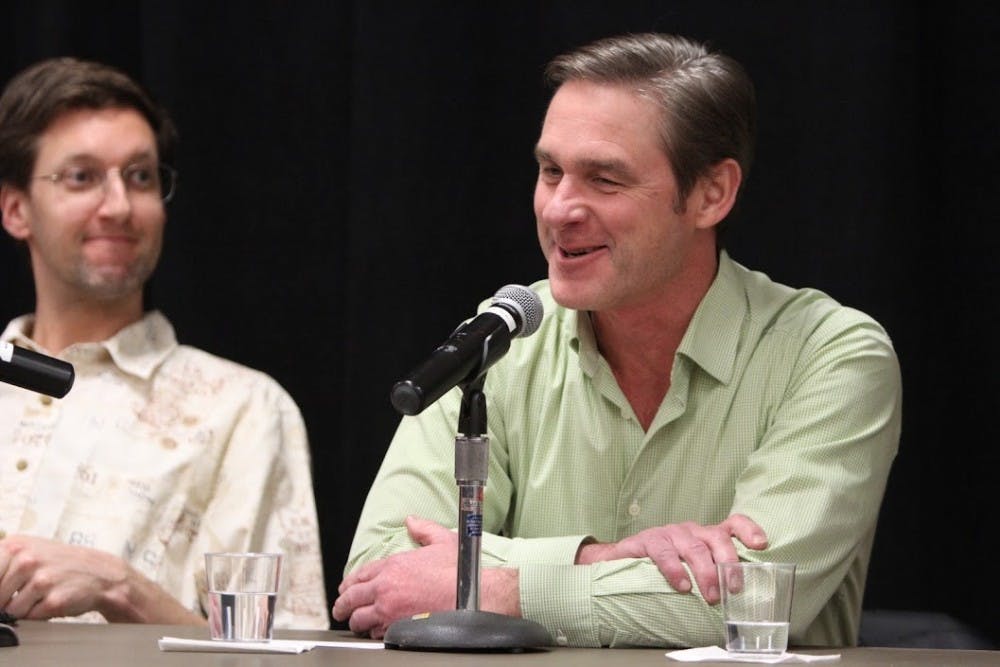The University of Portland alma mater goes, “Upon the bluff, high over the Willamette…” But UP doesn’t only sit above the river, it also neighbors Swan Island, an industrial site just south of The Bluff.
About 50 students and Portland community members filed into UP’s bookstore to learn about nuisance odors at the “Invisible Suffering: The Air We Share” event Monday night. The “interdisciplinary” conversation was led by a panel of professors and community members, who spoke about fumes in the University neighborhood and about the ethics behind different environmental policies to control those odors.
The discussion was centered around Daimler Trucks North America, a plant on Swan Island that Professor Ted Eckmann’s research found is releasing nuisance odors into the air around the university.
The panel included Alan Sprott, vice president of Vigor Industrial, a shipbuilding plant on Swan Island. Sprott admitted that the facility was expelling nuisance odors before entering a Good Neighbor Agreement with Neighbors for Clean Air in April of 2016, after which the company changed its processes to lower their air pollution.
Also on the panel was Mary Peveto, President of Neighbors for Clean Air, who helped create the agreement with Vigor, and has had conversations with Daimler trying to work toward similar emissions reductions.
However, unlike Vigor, Peveto said she feels Daimler won’t acknowledge its role in the problem.
“The conversations with Daimler really stalled on the area of acknowledging the impact and the responsibility,” Peveto said. “And still, to this day, the conversations between Daimler and the university park neighbors seems to rest on this issue of, is there harm? Is there an impact? Who is responsible? I find that particularly frustrating.”

Eckmann spoke about his research and how his data collection and analysis proved that Daimler is expelling nuisance odors at certain times of the day and year. His data, Peveto said, mirrors the experience of the neighbors who have been complaining for years.
However, Eckmann stressed that Daimler does not need to shut down, but rather work with the community to lower the facility's odors and remain in business.
“You might think I’m trying to shut businesses down — that’s not the case,” Eckmann said. “I have a lot of experience in keeping businesses alive and solving these problems. There’s a win-win in here. We can find a way to work with businesses locally, without shutting them down, but getting them to emit odors at different times of day.”
Environmental Ethics and Policy Professor Norah Martin provided an ethical viewpoint on the pollution problem by pointing out that the nuisance odors pollute the common space that the neighborhood and the industries share.
“The air is the commons we all use, but a few of us, those who own factories, are the ones making the cost-benefit analysis, and they are only making that analysis relative to themselves,” Martin said.
Students at the event wondered aloud whether Fr. Mark Poorman’s Presidential Advisory Committee on Sustainability would take any actions to reduce the effects of nuisance odors on The Bluff.
“It’s comforting to be in a place where we’re discussing ethics and decision making,” Peveto said.
AmyBeth Stevens, legislative assistant to House Representative Tina Kotek, was in attendance. Kotek has been active in the effort to investigate nuisance odors in the university neighborhood. Stevens ended the conversation by giving practical advice to students who want to make a difference.
“Industry has a huge impact on politics, but you also have a huge impact,” Stevens said. “If you are registered to vote here in Oregon, I suggest you look up your representative. It’s really important to have your voice heard … You can send me emails, so when I brief the speaker, I can say, I got 20 emails about nuisance odors, so she can take that to her committees and her members, and it actually makes a pretty big impact.”
Stevens can be contacted at amybeth.stevens@oregonlegislature.gov.








